UCI Road World Championships return to Norway - Preview
Wind, rain, rainbows and even some politics on tap in Bergen
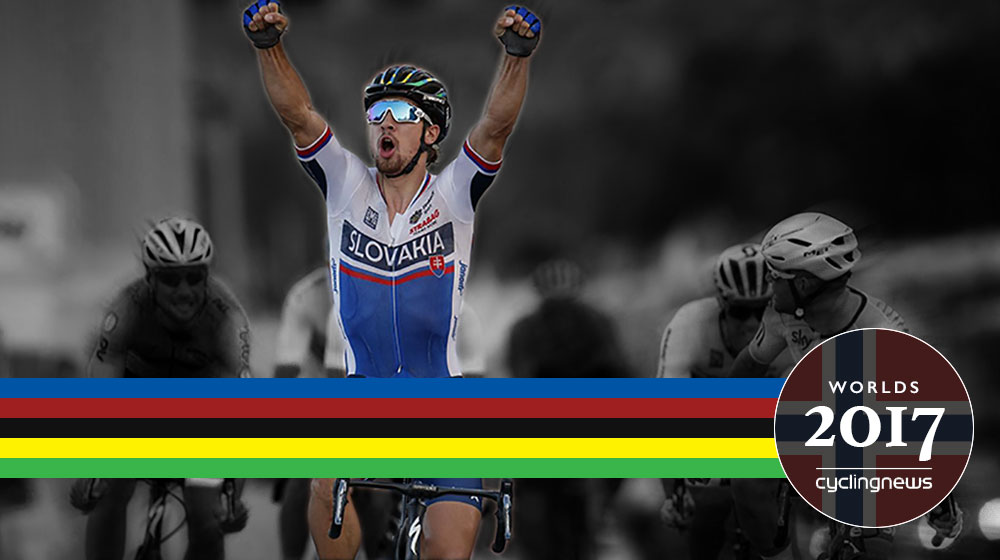
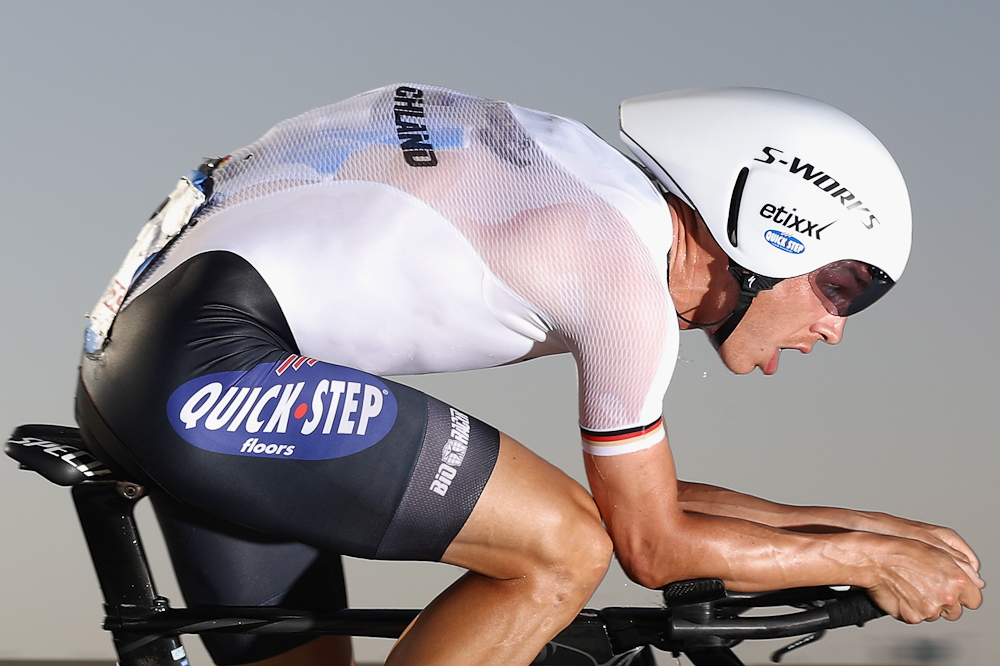
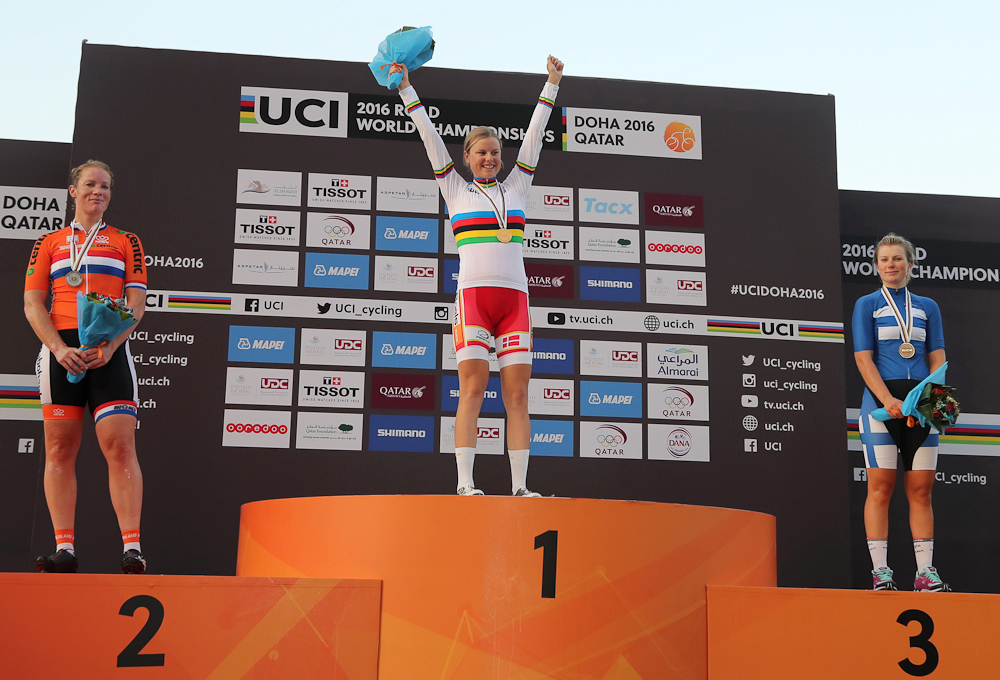
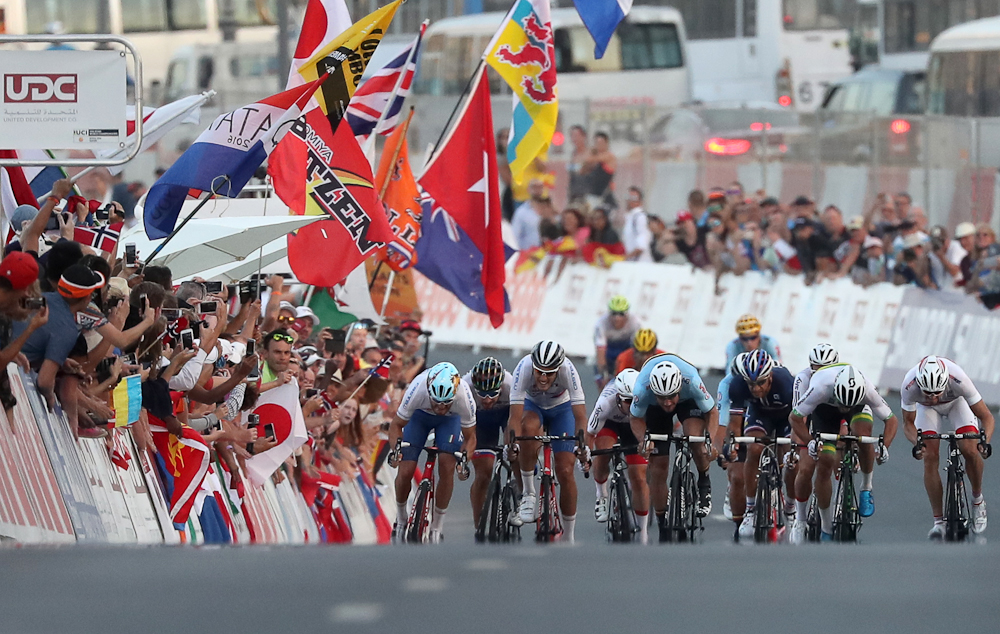
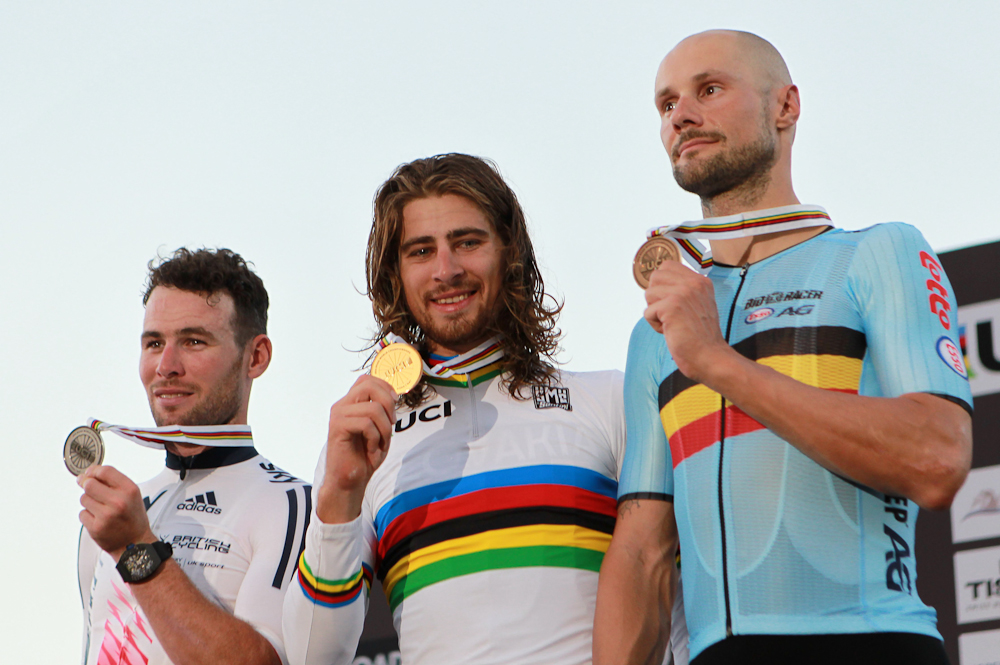
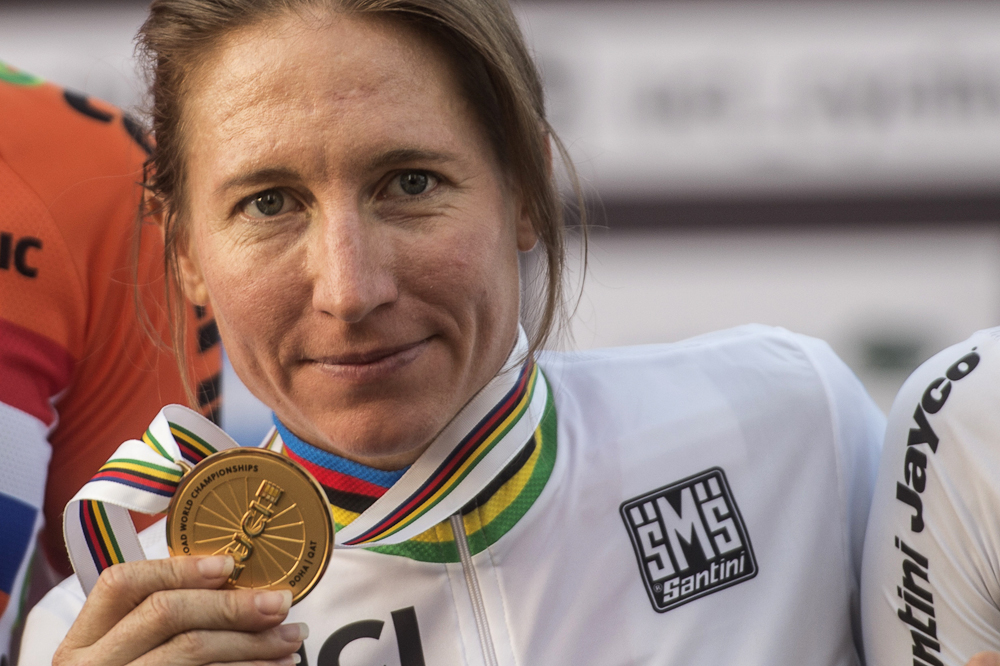
Twenty-four years after a young Lance Armstrong won the elite men's world title in Oslo, the UCI Road World Championships return to Norway, this time in the coastal city of Bergen close to the stunning fjords and western coastline of the northern European country.
The week in Bergen will be a mix of road racing, rainbow jerseys and cycling politics. The racing begins on Sunday, September 17, with the elite men's and women's team time trials. The individual time trials will be held between Monday and Wednesday, with the road races from Friday to Sunday, and the elite men's road race awarding the final rainbow jersey. Thursday sees the UCI Presidential election with incumbent Brian Cookson facing a serious challenge from Frenchman David Lappartient.
- Cyclingnews' complete 2016 UCI Road World Championships coverage
- 2017 UCI Road World Championships race schedule
- Maps and profiles for all time trial and road races
Cyclingnews will have complete coverage with race news, start lists, previews, start times, rider interviews, features, photography and race reports.
The northern location of Bergen means riders will be racing in cool temperatures and a likelihood of cold rain. Forecasts are for highs of 14C but lows of just 5C. The 19.1km urban circuit races should have a spring Classics feel about them, with the 1.5km long Salmon Hill the only significant climb of the circuit. As a result, the races should be tactical and entertaining, suiting a huge number of riders and making it difficult to predict eventual winners.
Peter Sagan (Slovakia) has a great chance of taking what would be a historical third-consecutive world title in the elite men's race, while the unusual uphill finish of the individual time trial should suit Chris Froome (Great Britain) and Tom Dumoulin (Netherlands) rather than the best pure time trialists. Marianne Vos (Netherlands) is back to her best but faces serious competition from her rivals in the women's road race, while the best junior and U23 athletes will also be fighting for world titles and medals on the same courses as the elite riders.
Men's road race
The sprinters dominated the 2016 World Championships in Qatar last year, and while the heat and echelons should not be a problem in Bergen, this year's race is expected to be a battle between the fast finishers and Classics riders, who are still on form after a long hard season.
It has been suggested the course perfectly suits Norway's Alexander Kristoff and Edvald Boasson Hagen. With input from race ambassador Thor Hushovd, that would be natural, but as a consequence the rolling rather than hilly course also suits Sagan, Greg Van Avermaet (Belgium), Philippe Gilbert (Belgium), Fernando Gaviria (Colombia), Michael Matthews (Australia), Michal Kwiatkowski (Poland) and John Degenkolb (Germany).
France has opted not to select a sprinter, leaving Nacer Bouhanni and Arnaud Demare at home and preferring to build its squad around Julian Alaphilippe. Italian national coach Davide Cassani has predicted a group of 30 or 40 riders will sprint it out for the world title after the 267.5km of racing, and so he has included Matteo Trentin, Elia Viviani, Sonny Colbrelli and Diego Ulissi in the Italian Squadra.
Mark Cavendish is not part of Great Britain's team, with the British hopes hanging on Ben Swift, Pete Kennaugh, Ian Stannard and Adam Blythe. The US team is equally lacking a standout name, with Brent Bookwalter, Alex Howes and Tejay van Garderen in the six-rider squad.
The elite men face a long day in the saddle, with endurance and mental strength likely to be as important as a fast finish. The race starts out in Kollsnes, amongst the western islands, with riders covering 39.5km before hitting the urban circuit around Bergen. The elite men face a further 11 full laps of the circuit to take them to the 267.5km total distance.
The finish is in the heart of the city, with a loop out south via Solheim and Arstad leading to the climb of Mount Ulriken (Salmon Hill). The 1.5km climb kicks up at 7.8 per cent for 500 metres and then continues at 5.6 per cent to the summit, passing through a residential area.
The climb is followed by a twisting descent and a 10km rolling road back to the city centre. An out-and-back final four kilometres north of the city could be effected by winds off the sea, but the distance from the climb to the finish favours the sprinters and the teams that can chase down any attacks, even on the final lap.
Positioning in the peloton will be important for the climb and in an eventual sprint. The final kilometre includes a left and right turn before the finishing straight in Festplassen.
The elite men's road race traditionally follows a set routine, with the early break staying out front until one or more of the major nations decides to take control and force a selection. With little terrain to help breaks go clear, the Bergen race should see more of a natural selection occur as the distance takes its toll. The weather could play a huge factor, with rain making for a far harder and more selective race, just as it did in Oslo in 1993, when Armstrong (USA) distanced Miguel Indurain (Spain), Olaf Ludwig (Germany) and the rest of a group of 10 by 19 seconds.
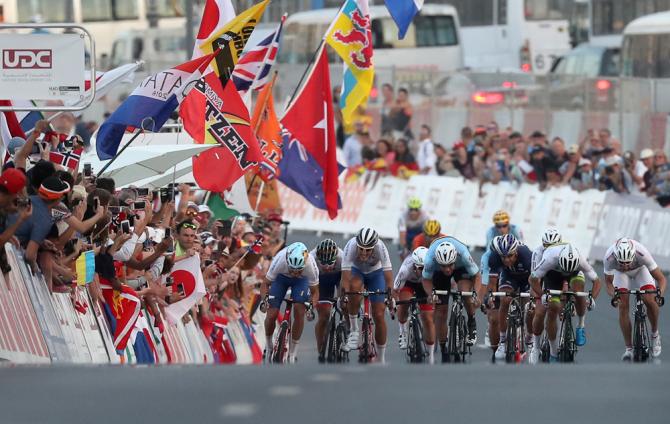
The reduced peloton nears the finish of the 2016 UCI Road World Championships elite men's road race. (Getty Images Sport)
Women's road race
The elite women face eight laps of the 19.1km Bergen circuit for a total of 152.8km. The women's race was arguably the most thrilling of the 2016 World Championships, and the strength of several leading riders and nations should see a similar entertaining battle this year.
The Dutch team is the strongest with Vos, Annemiek van Vlueten, Anna van der Breggen and Ellen van Dijk, but it remains to be seen if they can agree to a united strategy as they take on Australia, Great Britain, Belgium, France, Denmark and the US.
Vos showed her form by winning the European road title, but Van Vlueten bounced back from her Olympic crash to win two stages of the Giro Rosa, La Course on the Col d'Izoard and most recently the Boels Rental Ladies Tour in Belgium. Van der Breggen won five WorldTour races and the overall WorldTour title, and so also has a legitimate claim to leadership.
The US also has multiple options, thanks to Megan Guarnier and Coryn Rivera, while it will be interesting to see how the final Australian selection decisions impact their team and rider ambitions. Chloe Hosking could use her sprint finish in Bergen if she makes the team, but that could be in contrast with the hopes of the Orica-Scott riders selected.
Great Britain's Lizzie Armitstead has to be considered an outsider this year after her recent appendix operation. Amalie Dideriksen of Denmark is also on form after her year as world champion, while the combined force of the Italian team will be built around veteran Giorgia Bronzini.
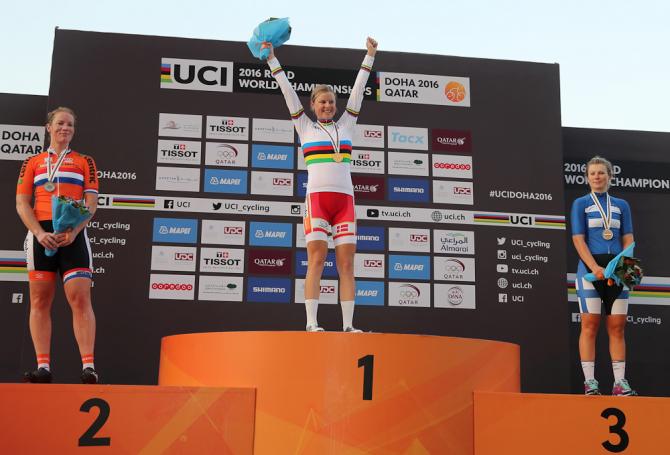
Kirsten Wild, Amalie Didericksen and Lotta Lepisto on the 2016 elite women's road race podium. (Getty Images Sport)
Time Trials
The team time trial for elite men's and women's professional teams is now established as the opening event, even if it struggles to attract many of the teams due to the skills needed to challenge specialists such as Quick-Step Floors, BMC and Boels Dolmans.
This year, the men's and women's races cover the same 42.5km course, which starts on the Askøy archipelago and then heads towards Bergen on stunning coastal roads. The 1.4km Birkelundsbakken climb after 30km will be a vital part of the course. Teams that can stay together over the climb will have a better chance of keeping the speed high on the final 11km to the finish.
Quick-Step Floors are keen to take back to back victories and have selected Niki Terpstra, Bob Jungels, Yves Lampaert, Julien Vermote, Philippe Gilbert and Jack Bauer. BMC and Orica-Scott have responded with their own six rouleurs, while Team Sky are hoping the presence of Chris Froome, Vasil Kiryienka and Geraint Thomas can help them finish at least on the podium.
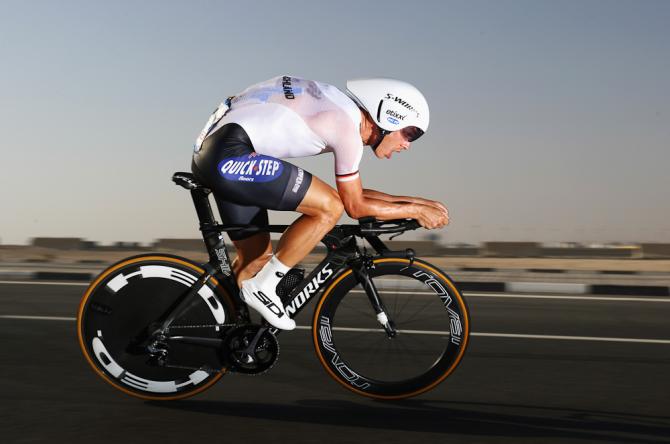
Tony Martin en route to the 2016 elite men's time trial title. (Getty Images Sport)
Individual time trial contenders
While all the individual time trial courses are based on the Bergen circuit and the Birkelundsbakken climb, the elite men's time trial on Thursday, September 20, ends with a painful twist and a 3.4km climb up Mount Fløyen overlooking the city.
The climb twists and turns with sections at more than 10 per cent. It means the traditional world title contenders such as Tony Martin (Germany) will have little chance, while Dumoulin, Froome and Rohan Dennis (Australia) seem the ideal contenders for the rainbow jersey. The Dutchman Dumoulin has built the second half of his season around the event, while Froome comes off his Vuelta a Espana victory with arguably tired legs but great form and a chance to add a world tile to his season's historic haul. Dennis is the dark horse after quitting the Vuelta the day before the individual time trial.
Several riders, including Dumoulin, have reportedly asked the UCI about switching from time trial to road bikes for the final climb. A bike change usually costs a rider 20 seconds but could be worth it in Bergen.
American Amber Neben will defend her rainbow jersey in Bergen, while 20-year-old Chloe Dygert, the 2015 double world champion as a junior, will jump a category and race the elite event.
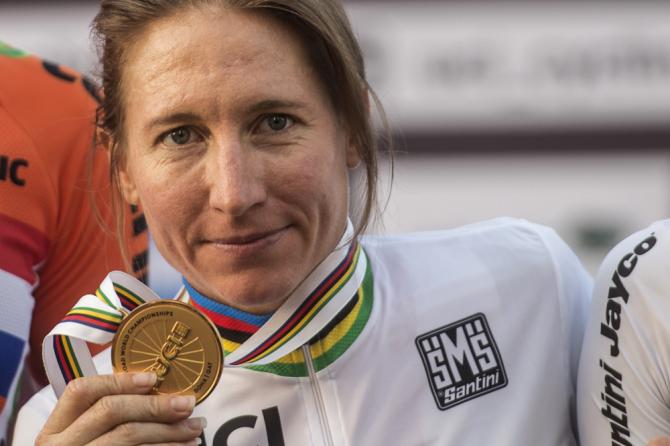
Amber Neben shows off her gold medal from the 2016 elite women's time trial. (Getty Images Sport)
The latest race content, interviews, features, reviews and expert buying guides, direct to your inbox!

Stephen is one of the most experienced member of the Cyclingnews team, having reported on professional cycling since 1994. He has been Head of News at Cyclingnews since 2022, before which he held the position of European editor since 2012 and previously worked for Reuters, Shift Active Media, and CyclingWeekly, among other publications.
Latest on Cyclingnews
-
Where's the beef? The UAE-Visma Tour de France rivalry is intense but respectful so far
"UAE and Visma are perhaps the strongest teams but only one can win," says Mauro Gianetti -
'I wonder how they recover like that every day' – Mathieu van der Poel loses yellow jersey at Tour de France as Grand Tour fatigue sets in
Dutchman more than satisfied with performance in first seven stages despite getting dropped on return to Mûr-de-Bretagne -
'I don't know if I'm getting any closer to that win' – Oscar Onley best of the rest behind Pogačar and Vingegaard on Tour de France stage 7
World champion says young Scot has 'showed in the past already how a superb rider he is, with a punchy kick' after third place at Mûr-de-Bretagne -
'I have a bit of a fractured rib but should be OK' - João Almeida hopes to race on and help Tadej Pogačar in Tour de France despite high-speed crash
Key UAE mountain domestique suffering from injuries to ribs, finger, elbow and multiple road rash



